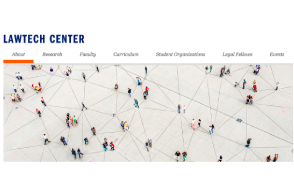The University of Virginia School of Law is launching a new scholarly center that will focus on pressing questions in law and technology, with Professor Danielle Citron serving as inaugural director.
The LawTech Center will address policy issues, legal texts as data and the use of tech in the legal profession.

“While some of the topics may be focused on matters at the heart of public debate — like the legal responsibilities of online platforms, privacy and security legislation, or algorithms used in criminal sentencing — others may be dedicated to educating students, academics, lawyers and the public about the laws and policies governing networked technologies,” Citron said. “We also have a tradition at UVA of using empirical methods to examine legal texts and teaching about how lawyers and the legal system use technology.”
The Law School has been offering technology-focused courses for years. Classes this year include Advanced LawTech with Professor Michael Livermore, the Law and Technology Colloquium with Citron and Professor Kristen Eichensehr, and Cyber and Information Operations, in partnership with the Judge Advocate General’s Legal Center and School.
In addition, the Law School already hosts several student groups that focus on law and technology issues, including the Virginia Journal of Law & Technology, LIST (Law, Innovation, Security & Technology) and the National Security Law Forum. Citron said the center looks forward to partnering with these groups.
Citron is the Jefferson Scholars Foundation Schenck Distinguished Professor in Law at UVA. A recipient of a 2019 MacArthur Foundation Fellowship, informally known as a genius grant, she writes and teaches about privacy, free expression and civil rights. She is the author of the book “Hate Crimes in Cyberspace” and has been deeply involved in reform efforts relating to the regulation of online platforms. In October 2019, she testified before Congress about Section 230 of the Communications Decency Act and is currently working with Senate and House staff on proposed Section 230 amendments. She has been an ongoing adviser to Facebook and Twitter on privacy and safety matters.
Her second book, “Intimate Privacy: A Civil Right,” will be published next year by W.W. Norton and Penguin Vintage UK.
The second-most cited professor in the nation on issues of law and technology, Citron is among the center’s long list of professors who write about issues that implicate the digital realm. Other affiliated faculty include Aditya Bamzai, Ashley Deeks, Eichensehr, George Geis, Deborah Hellman, Craig Konnoth, David Law, Livermore, Richard Re, Thomas Nachbar, Dotan Oliar, Lawrence B. Solum and Megan Stevenson.
Some recent examples of faculty scholarship include:
- Citron’s paper “Privacy Injunctions,” forthcoming in the Emory Law Journal. It examines what injunctive relief might look like for victims of nonconsensual pornography and deepfake sex videos. In addition, her paper “Presidential Privacy Violations,” forthcoming in the Illinois Law Review, tackles the significance of government speech that invades intimate privacy and in particular when the president and executive branch do so.
- Eichensehr’s paper “Cyberattack Attribution as Empowerment and Constraint” for the Hoover Institution. It asks the question, “When a state seeks to defend itself against a cyberattack, must it first identify the perpetrator responsible?”
- Hellman’s paper “Big Data and Compounding Injustice,” published this year in the Journal of Moral Philosophy. The piece looks at the potential for harm to snowball if the data used reflects past injustices.
- Livermore’s co-edited 2019 book “Law as Data: Computation, Text, and the Future of Legal Analysis.”
- Nachbar’s paper “Platform Effects.” The article looks at antitrust concerns about platforms such as Google, Amazon, Facebook and Apple.
- Stevenson’s paper “Algorithmic Social Engineering.” The piece examines how algorithms are used to nudge decision-makers.
The center will also benefit from lecturers and other researchers, such as Thomas Haley, a research assistant professor of law whose article “Data Protection in Disarray” was selected for the Junior Faculty Forum for Law and STEM at Stanford Law School.
UVA Law scholarship has some common themes, Citron said. Professors’ research often scrutinizes powerful intermediaries, both in the public and private sectors, whose decisions may affect the personal lives of individuals, the public’s health and safety, or even the whole economy.
“Debbie and Megan’s scholarship, for example, have been so influential in how we think about algorithmic decision-making systems, from empirical and moral perspectives,” Citron said.
Exploring the relationship between technology and the law enables faculty to span any range of subjects, from environmental law to national security law to criminal law. Livermore, for example, also directs the environmentally focused Program in Law, Communities and the Environment, or PLACE. He uses cost-benefit analysis, machine learning and computer models to inform his scholarship and teaching, which includes courses on the use of technology in the legal profession.
“Advances in natural language processing, machine learning and other AI techniques are already transforming legal practice, and more change is on the horizon,” Livermore said. “Law students today must prepare for this future by understanding the interaction of advanced computational technologies and the law.”
He added that the LawTech Center also reflects the growing interest among legal scholars in using sophisticated computational tools, such as natural language processing, to understand the law and legal institutions. Both Livermore and Law are leading researchers in this new field.
One of the center’s first special projects will be investigating if informing the public about attacks on critical infrastructure would create social harm or be helpful; currently, private companies that run utilities, such as water treatment plants, have no legal obligation to disclose when they’ve been hacked. Also, the center will sponsor research on the role of cities and other municipalities in privacy policymaking.
Planned programming for the spring includes guest speakers and a “tabletop exercise” for students to simulate an organizational response to a cyberattack. Citron will partner with affiliated professors such as Eichensehr, who directs the National Security Law Center, as well as other public- and private-sector professionals and student leaders in preparing the exercise.
“Kristen is one of several UVA Law professors who so ably inform the national security component of LawTech,” Citron said. “That includes Professor Ashley Deeks, who is on currently on leave serving the White House as associate counsel and deputy legal adviser to the National Security Council.”
The center also looks to host an in-person conference on the governance of online platforms — those tech companies who have entered our everyday lives both socially and professionally — sometime in 2023.
Source: https://www.law.virginia.edu/news/202109/new-lawtech-center-focus-data-online-policy




